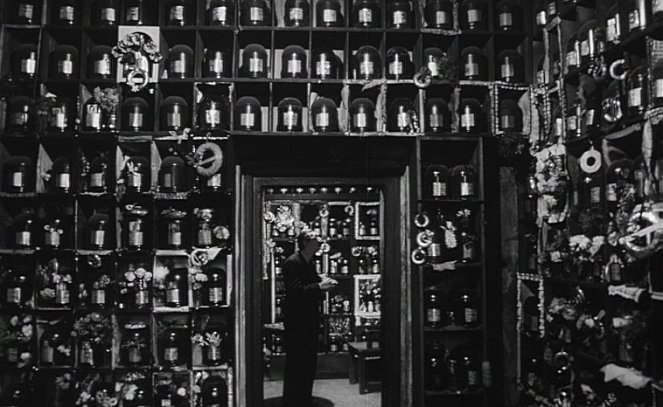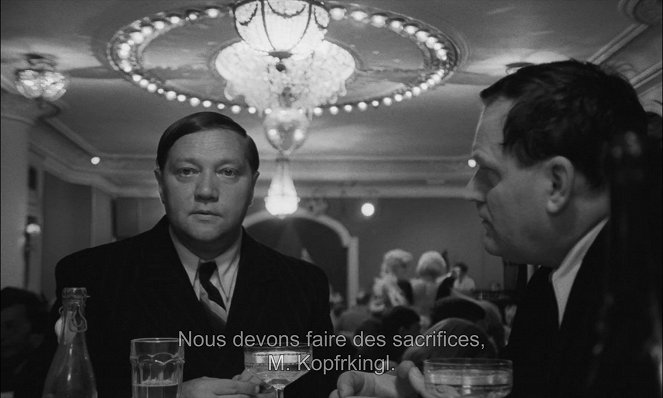Directed by:
Juraj HerzCinematography:
Stanislav MilotaComposer:
Zdeněk LiškaCast:
Rudolf Hrušínský, Vlasta Chramostová, Jana Stehnová-Čechová, Miloš Vognič, Ilja Prachař, Zora Božinová, Eduard Kohout, Jiří Lír, Dimitrij Rafalský, Jan Vlček (more)VOD (2)
Plots(1)
Czechoslovak New Wave iconoclast Juraj Herz’s terrifying, darkly comic vision of the horrors of totalitarian ideologies stars a supremely chilling Rudolf Hrušínský as the pathologically morbid Karel Kopfrkingl, a crematorium director in 1930s Prague who believes fervently that death offers the only true relief from human suffering. When he is recruited by the Nazis, Kopfrkingl’s increasingly deranged worldview drives him to formulate his own shocking final solution. Blending the blackest of gallows humor with disorienting expressionistic flourishes—queasy point-of-view shots, distorting lenses, jarring quick cuts—the controversial, long-banned masterpiece The Cremator is one of cinema’s most trenchant and disturbing portraits of the banality of evil. (Criterion)
(more)Videos (2)
Reviews (8)
What more can I say? This film is big! Thanks to Rudolf Hrušínský, great thanks to Ladislav Fuks' book, which Herz was able to translate into an equally suggestive image in an absolutely incredible way. The overall stylization and the very sleek, regular pace of storytelling accurately mirror Roman Kopfrkingl's heart, where everything unfolds in concentric circles, where the same sentences and the same thoughts are repeated over and over again, and where a morbid obsession gradually emerges. First death, then your own specialness. The inner life of a man whose whole world is built on a game, to deny reality and transform it into something bizarrely humble, kind, and sleek, including death. Hrušínský as a half-empty vessel, gradually filled with the poison of ideology and conviction of his own importance, is inhumanly convincing. So is Herz's entire film... The most suggestive portrait of the madness of man and time period that I know.
()
The Cremator can be thought of as either a deep psychological thriller or a comedy with the most morbid type of black humour. Either way, it is a high quality film in both respects, one of the best that was made in this country in the 1960s. Rudolf Hrušínský's breathtaking performance is a prime example of how one actor can conjure up an entire film all to himself, and even lead it. His monotonous and to some extent even kindly voice caused me considerable disgust, which kept building up over time. Zdeněk Liška's music is also nothing short of fabulous, especially the main theme with its unforgettable female vocals. In addition, I was impressed by the elaborate production design (Kopfrkingl's apartment and the crematorium), the visual technique of the "fisheye" and the number of bizarre supporting characters. In short, a film that is the ultimate experience that sends chills down your spine and makes your blood run cold in your veins
()
I don't remember when I was so cold during a film the entire time, without anything scary or disturbing happening. Just Hrušínský's presence left me frightened whenever he appeared in a shot. The highlight is the scene of the funeral speech in the closing, where his masterful acting is brought to perfection. Top-notch filmmaking quality, watching it again would require a little bit of courage.
()
"The Cremator" is an incredible movie, really. But there wasn't much doubt about that. Its history has already been thoroughly reviewed. The way Juraj Herz uses the camera, capturing various details, and the constant echo of Hrušínský's voice, these are just the basics of the creeping horror that sneaks into your heart. An immensely professional and complex work that truly has no equal in Czech and Slovak history.
()
Together with Markéta Lazarova, this is probably the greatest treasure ever to come out of Czechoslovak cinema. The masterful direction dictates a very evocative and incredibly depressing atmosphere, which is further deepened by Liška's brilliant, almost ethereal (as usual) music and the now famous "fisheye" camera, whose contribution to the final artistic and emotional impact of the film is incalculable. The rest is taken care of by the slick and endlessly garrulous Rudolf Hrušínský, who portrays his book character so believably that even Fuks himself had to shudder at his performance. A shocking, cinematically timeless and thought-provoking work that leaves the patient viewer with so many feelings, impressions and attitudes that repeated viewings are mandatory. One of the few times I put a film adaptation above the level of the book. 95%
()
Gallery (57)
Photo © Filmové studio Barrandov



Ads